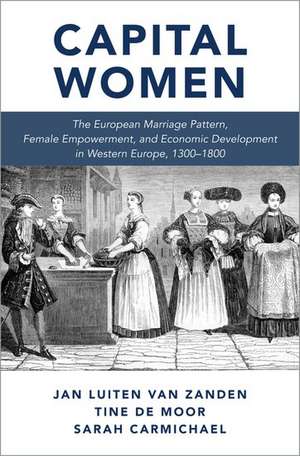Capital Women: The European Marriage Pattern, Female Empowerment and Economic Development in Western Europe 1300-1800
Autor Jan Luiten van Zanden, Sarah Carmichael, Tine De Mooren Limba Engleză Hardback – 11 apr 2019
Preț: 511.14 lei
Preț vechi: 587.51 lei
-13% Nou
Puncte Express: 767
Preț estimativ în valută:
97.84€ • 106.31$ • 82.24£
97.84€ • 106.31$ • 82.24£
Carte tipărită la comandă
Livrare economică 09-15 aprilie
Preluare comenzi: 021 569.72.76
Specificații
ISBN-13: 9780190847883
ISBN-10: 0190847883
Pagini: 304
Dimensiuni: 155 x 236 x 28 mm
Greutate: 0.54 kg
Editura: Oxford University Press
Colecția OUP USA
Locul publicării:New York, United States
ISBN-10: 0190847883
Pagini: 304
Dimensiuni: 155 x 236 x 28 mm
Greutate: 0.54 kg
Editura: Oxford University Press
Colecția OUP USA
Locul publicării:New York, United States
Recenzii
Women matter! Capital Women is a strong and compelling book. It will be of the upmost interest for all those who wish to understand the ongoing debate about the historical role played by women in economic growth, progress, and development in Western Europe.
Development economists have long argued that if free to act for themselves and their families, women can contribute to growth and development; indeed the need to empower women has become a staple of development policy. Capital Women will help economic historians get up to date in understanding how women's agency can be seen as crucial to the development of Western Europe. Jan Luiten van Zanden, Tine De Moor, and Sarah Carmichael use a wide range of measures of economic activity, including their original "Girlpower-Index", to measure female agency and autonomy and then link these to the dynamics of development. Capital Women brings "Girlpower" into the economic historians' mainstream.
This book addresses from new angles the old debate on the origins, the characteristics and the consequences of the European Marriage Pattern. It makes a very substantial and timely contribution to our knowledge of preindustrial societies - and it will surely inspire research and solicit debate for years to come.
Development economists have long argued that if free to act for themselves and their families, women can contribute to growth and development; indeed the need to empower women has become a staple of development policy. Capital Women will help economic historians get up to date in understanding how women's agency can be seen as crucial to the development of Western Europe. Jan Luiten van Zanden, Tine De Moor, and Sarah Carmichael use a wide range of measures of economic activity, including their original "Girlpower-Index", to measure female agency and autonomy and then link these to the dynamics of development. Capital Women brings "Girlpower" into the economic historians' mainstream.
This book addresses from new angles the old debate on the origins, the characteristics and the consequences of the European Marriage Pattern. It makes a very substantial and timely contribution to our knowledge of preindustrial societies - and it will surely inspire research and solicit debate for years to come.
Notă biografică
Jan Luiten van Zanden is professor of Global Economic History at Utrecht University. His research interests focus on the reconstruction and explanation of long-term trajectories in the world economy with the goal of understanding the deep roots of contemporary societal problems.Tine De Moor is professor of Institutions for Collective Action in historical perspective at Utrecht University. She is closely engaged with translating insights from the study of collectively managed institutions in the past to help organisations working in the present. Sarah Carmichael is an Assistant Professor in the economic and social history group of Utrecht University. Her research focuses on devising historical measures of gender inequality and exploring how family organization impacts upon the position of women.
